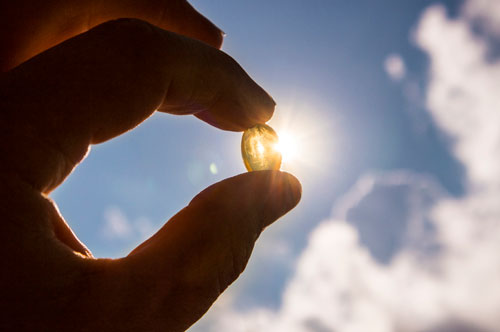Here’s the scariest thing about the coronavirus epidemic…
Doctors have no way to prevent it.
And they have nothing that treats it.
Researchers are working furiously to come up with a vaccine. But it looks like they are at least a year away from developing one.
They are also trying to come up with antiviral drugs that can treat it. That will also take months, if not years.
But there may be an effective, natural way to prevent coronavirus that is hiding in plain sight. In study after study, one vitamin has shown that it can stop upper respiratory viruses like coronavirus.
And unlike vaccines and drugs, it has virtually no side effects.
Vitamin D: Powerful Protection From Viruses
A major 2017 study published in the British Medical Journal looked at vitamin D’s effectiveness against viral infections. Researchers analyzed 25 clinical trials that included 11,321 people. The data came from 14 countries, including the U.S., England, Japan, Australia, Canada, and Italy.
The study found that taking vitamin D supplements cuts in half the risk of respiratory infections caused by viruses.[1]
The researchers concluded: “Vitamin D supplementation was safe and it protected against acute respiratory tract infection.”
A 2012 Spanish study uncovered the mechanism by which vitamin D strengthens immunity.[2]
The researchers looked at blood levels of vitamin D in three age groups: young (20–30), middle (31–59), and seniors (60–86).
They found that seniors had lower vitamin D levels than other age groups. And their levels dropped more in the winter.
When seniors’ vitamin D levels fell, the scientists observed that their immunity against viruses was weaker. Without sufficient vitamin D, proteins called toll-like receptors that start the immune response did not react as strongly.
Dr. Victor Manuel Martinez-Taboada led the study. He is a researcher at University Hospital in Santander, Spain. He said that vitamin D is a potent weapon against viruses.
“Vitamin D supplements should be considered one of the many tools that might help when conventional therapies are not enough,” he said.
Other research has found that vitamin D improves viral immunity by strengthening your mucus membranes.[3]
The coronavirus and other germs get into your body through entry points that are covered with mucus membranes. They include your nose, mouth, eyelids, lungs, trachea (windpipe), stomach, and urinary tract.[4]
A lab study at the University of Illinois found that vitamin D helps mucus membranes provide a stronger barrier to viruses by increasing the antimicrobial compounds in them.[5]
With coronavirus becoming a threat only in recent months, researchers have not yet had time to test vitamin D directly against it. But they say there’s no reason to think that it would not work just as well against coronavirus as it does against the flu, colds, and other upper respiratory viruses.
Dr. Daniel Amen runs a chain of U.S. health clinics. To protect themselves from coronavirus, he is advising all his patients to get their vitamin D levels checked.[6]
If you are over 65, there’s a good chance you are deficient in vitamin D. A study published in the journal Nutrients found that half of seniors have levels that are too low.[7]
Try to get 15 minutes of direct sunlight a day with your arms and legs exposed. And have your doctor check your vitamin D level. It’s a simple blood draw.
Normal levels in a reading are 40-60 ng/mL.
It may not be possible for you to increase your sun exposure during the cold winter months. If that’s the case, take a quality vitamin D3 supplement. We recommend 5,000 IUs a day.
Editor’s Note: If you’re worried about the coronavirus outbreak, you need to know about “infinite immunity.” It’s a recent Nobel Prize-winning discovery that gives your body the power to fight off most infections. You can find out more by reading our monthly journal, Independent Healing. Go HERE.
Related Articles
New Study Reveals the Best Kind of Vitamin D
Don’t Ever Ignore Signs of this Vitamin Deficiency
Taking Vitamin D? Take This Too
Like this Article? Forward this article here or Share on Facebook.
[1] https://www.bmj.com/content/356/bmj.i6583
[2] https://www.eurekalert.org/pub_releases/2012-04/foas-vds043012.php
[3] https://www.ncbi.nlm.nih.gov/pmc/articles/PMC2955835/
[4] https://www.britannica.com/science/mucous-membrane
[5] https://www.mdpi.com/2072-6643/9/12/1276
[6] https://www.amenclinics.com/what-to-do-about-the-coronavirus/

